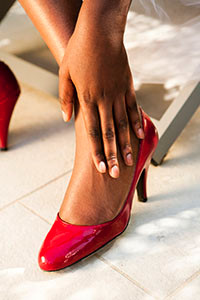
Drexel Hill (484) 521-0233
West Chester (610) 436-5883

Drexel Hill (484) 521-0233
West Chester (610) 436-5883
 About 79 percent of runners experience some type of foot injury each year. It requires a bit of extra work to keep your feet in top running order, however it is necessary in order to prevent injury. If you want to make your feet less susceptible to injury, you should focus on strengthening your soles. According to clinical director Luke Bongiorno, "When your feet are stronger, you'll have better propulsion, which can help you run faster and more efficiently.” You should also be more selective when it comes to buying a new pair of running shoes. Recent studies have shown that minimalist sneakers may be more effective in preventing injury compared to running sneakers with high arches.
About 79 percent of runners experience some type of foot injury each year. It requires a bit of extra work to keep your feet in top running order, however it is necessary in order to prevent injury. If you want to make your feet less susceptible to injury, you should focus on strengthening your soles. According to clinical director Luke Bongiorno, "When your feet are stronger, you'll have better propulsion, which can help you run faster and more efficiently.” You should also be more selective when it comes to buying a new pair of running shoes. Recent studies have shown that minimalist sneakers may be more effective in preventing injury compared to running sneakers with high arches.
Exercising your feet regularly with the proper foot wear is a great way to prevent injuries. If you have any concerns about your feet, contact the podiatrists of Dr. Siegerman & Associates. Our doctors will treat your foot and ankle needs.
How to Prevent Running Injuries
Many common running injuries are caused by overuse and overtraining. When the back of the kneecap starts wearing out and starts causing pain in your knee, this is commonly referred to as runner’s knee. Runner’s knee is a decrease in strength in your quadriceps and can occur if you’re not wearing properly fitted or supporting shoes. To prevent runner’s knee, focusing on hip strengthening is a good idea, as well as strengthening your quads to keep the kneecaps aligned.
What Are Some Causes of Running Injuries?
- One cause of a common running injury is called iliotibial band syndrome.
- Plantar fasciitis is also another common injury.
- Stress fractures can occur from overtraining, lack of calcium, or even your running style.
Best Ways to Prevent Running Injuries
- Wear footwear that fits properly and suits your running needs.
- Running shoes are the only protective gear that runners have to safeguard them from injury.
- Make a training schedule. Adding strengthening exercises as well as regular stretching can help keep you strong and limber and can lessen the possibility of injuries.
- Stretching keeps muscles limber; this will help you gain better flexibility.
If you have any questions please feel free to contact one of our offices located in Drexel Hill and West Chester, PA . We offer the newest diagnostic and treatment technologies for all your foot and ankle needs.
 The number of negative effects wearing high heels has on the body is high, to say the least. It is a wonder they are worn as much as they are. Part of the reason is that many office dress codes require them. This practice is being challenged more and more as new studies come out showing exactly how bad high heels can be for your overall health. Foot strain is something all heel-wearing people can certainly attest to. The foot strain can then lead to back pain and knee pain as well. Even more seriously, wearing of high heels has been linked to such disorders as arthritis, Morton's neuroma, and Haglund's deformity. If you are suffering from any of these symptoms, it may be time to kick off those heels for good.
The number of negative effects wearing high heels has on the body is high, to say the least. It is a wonder they are worn as much as they are. Part of the reason is that many office dress codes require them. This practice is being challenged more and more as new studies come out showing exactly how bad high heels can be for your overall health. Foot strain is something all heel-wearing people can certainly attest to. The foot strain can then lead to back pain and knee pain as well. Even more seriously, wearing of high heels has been linked to such disorders as arthritis, Morton's neuroma, and Haglund's deformity. If you are suffering from any of these symptoms, it may be time to kick off those heels for good.
High heels have a history of causing foot and ankle problems. If you have any concerns about your feet or ankles, contact the podiatrists from Dr. Siegerman & Associates. Our doctors can provide the care you need to keep you pain-free and on your feet.
Effects of High Heels on the Feet
High heels are popular shoes among women because of their many styles and societal appeal. Despite this, high heels can still cause many health problems if worn too frequently.
Which Parts of My Body Will Be Affected by High Heels?
What Kinds of Foot Problems Can Develop from Wearing High Heels?
How Can I Still Wear High Heels and Maintain Foot Health?
If you want to wear high heeled shoes, make sure that you are not wearing them every day, as this will help prevent long term physical problems. Try wearing thicker heels as opposed to stilettos to distribute weight more evenly across the feet. Always make sure you are wearing the proper shoes for the right occasion, such as sneakers for exercising. If you walk to work, try carrying your heels with you and changing into them once you arrive at work. Adding inserts to your heels can help cushion your feet and absorb shock. Full foot inserts or metatarsal pads are available.
If you have any questions please feel free to contact one of our offices located in Drexel Hill and West Chester, PA . We offer the newest diagnostic and treatment technologies for all your foot and ankle needs.
Request a free copy of
Laser Away Foot Pain!
today.
